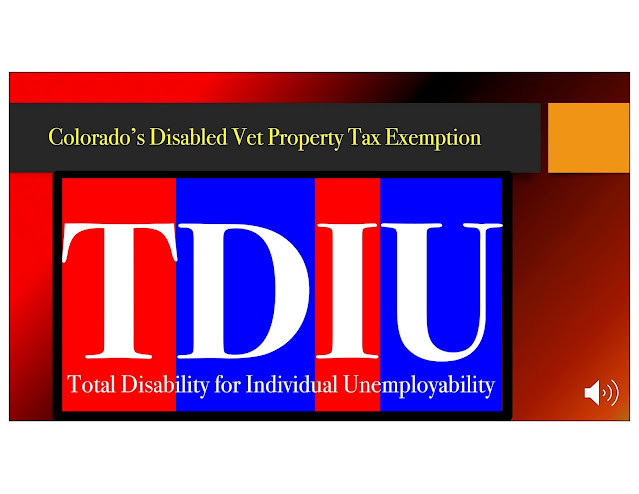Yes. It appears that for nearly fifteen years Colorado has accidentally but unconstitutionally overcharged hundreds of our 100% disabled military veterans by $4,050,000! Nearly seven percent of the totally disabled military veterans in Colorado are involved.This is a complicated constitutional argument to follow, so have fun! (The final paragraph provides the reasoning behind the $4.1M unfairly taxed from vets.)
In 2007 voters approved Referendum E to create Article X Section 3.5, qualifying 100% disabled military veterans a partial property tax exemption similar to the senior exemption. This had been referred to the voters by the legislature for constitutional amendment as S.C.R. 06-001:
"Property tax exemption for disabled veterans. For property tax years commencing on or after January 1, 2007, extends the existing property tax exemption for qualifying seniors to any United States military veteran, including any member of the Colorado national guard who has been ordered into the active military service of the United States, who has been separated from service under honorable conditions and who is 100% permanently disabled due to a service-connected disability. Requires the state to compensate local governments for property tax revenues lost as a result of the extension of the exemption."
For following this issue today, the relevant part of Article X Section 3.5, the amendment created by Referendum E is:
"(1.5) For purposes of this section, 'disabled veteran' means an individual who has served on active duty in the United
States armed forces, including a member of the Colorado national guard who has been ordered into the active military
service of the United States, has been separated therefrom under honorable conditions, and has established a service-connected disability that has been rated by the federal department of veterans affairs as one hundred percent
permanent disability through disability retirement benefits or a pension pursuant to a law or regulation administered by
the department, the department of homeland security, or the department of the army, navy, or air force"
The legislature then turned to provide an enabling statute to implement the new amendment, passing HB07-1251:
"(3.5) 'QUALIFYING DISABLED VETERAN' MEANS AN INDIVIDUAL WHO HAS SERVED
ON ACTIVE DUTY IN THE UNITED STATES ARMED FORCES, INCLUDING A MEMBER OF
THE COLORADO NATIONAL GUARD WHO HAS BEEN ORDERED INTO THE ACTIVE
MILITARY SERVICE OF THE UNITED STATES, HAS BEEN SEPARATED THEREFROM
UNDER HONORABLE CONDITIONS, AND HAS ESTABLISHED A SERVICE-CONNECTED
DISABILITY THAT HAS BEEN RATED BY THE UNITED STATES DEPARTMENT OF
VETERANS AFFAIRS AS ONE HUNDRED PERCENT PERMANENT AND TOTAL DISABILITY
PURSUANT TO A LAW OR REGULATION ADMINISTERED BY THE DEPARTMENT."
HB07-1251 begat the tax details in C.R.S. Section 39-3-202 which read (until 2016 with HB16-1444):
(3.5) "Qualifying disabled veteran" means an individual who has served on active duty in the United States armed forces, including a member of the Colorado National Guard who has been ordered into the active military service of the United States, has been separated therefrom under honorable conditions, and has established a service-connected disability that has been rated by the federal department of veterans affairs as a one hundred percent permanent disability through disability retirement benefits pursuant to a law or regulation administered by the department.
By the plain reading of the new constitutional amendment, all a qualified vet would have to do is present a copy of their VA certification or proof of medical retirement from the armed forces as totally disabled in the line of duty. Both were specified in Article X Section 3.5 because some military retirees never seek a VA disability – a number estimated by the state at about 450.
The problem causing vets being forced to pay extra property taxes by being denied the exemption arose when the constitutional amendment in Referendum E was implemented in tax statutes. The Legislature passed HB07-1251 and in doing so, forgot (neglected, opted against) to include the last fifteen words of Article X Section 3.5 – "the department of homeland security, or the department of the army, navy, or air force"
Do you see it? Compare the last fifteen words in Article X Section 3.5 against subsequent legislation. The lawmakers clearly did not include the referendum's provision for 100% disabled military retirees. Fifteen words left out denied the exemption to about 450 veterans.
By the plain reading of the new constitutional amendment, all a qualified vet would have to do is present a copy of their VA certification or proof of medical retirement from the armed forces as totally disabled in the line of duty. Both were specified in Article X Section 3.5 because some military retirees never seek a VA disability – a number estimated by the state at about 450.
Here's our problem: Colorado’s constitution is supreme, trumping statutory law in areas of conflict. Article X Section 3.5 therefore outguns HB07-1251, at least in the part where disabled military retirees are left out of the legislation.
So HB07-1251 seems unconstitutional. Only the Supreme Court can declare it so, but the plain meaning of the words (and of the words not included in the statute) is very clear. 100% disabled military retirees separated by their services should have been receiving our Disabled Veteran Property Tax Exemption since 2007.
In 2014 along came a 100% disabled military retiree who's application for the exemption was denied by CDMVA. The vet was initially rebuffed, referred back to the statute and various forms. But then he tracked the statutes back to the constitution and Article X Section 3.5. Even reading it a few times wasn't illuminating, at least not until he read it a bit more slowly and noted those missing fifteen words! Eureka!
This could have been resolved by working the issue up to the Supreme Court, but sympathetic advice from DOLA experts proved much more effective – "go to your legislators."
A couple phone calls, a few town hall meetings and many letters and emails later, Senator John Kefalas and other legislators took the bit in their teeth and got HB16-1444 enacted. That happened because the United Veterans Coalition backed the issue by making it a 2006 legislative objective.
So, this little problem solved, thought the vet. HB16-1444 took effect in 2017 and he got his exemption, although he'd also received a VA 100% rating to replace his initial VA 100% disability rating for TDIU. Then in 2018 he noticed few of the counties updated forms or instructions to include those fifteen last words left out that got the correction.
Off went a missive to DOLA, asking them to urge counties and other state agencies to more closely adhere to the law. DOLA responded quickly, posting another reminder that circulated throughout the state. DOLA also said they'd update their own form and web site information.
Problem solved? No. Checking this month of June 2021, four years after HB16-1444 went into effect, fourteen years after the constitutional mistake was made, DOLA, Treasury, CMDVA and other agencies and most counties still fail to include 100% military disabled retirees.
How did the figure $4,050,000 get calculated? The number of 450 affected disabled military retirees from state agency reports was multiplied by $600 for the average value of the property tax exemption denied them, then multiplied by fifteen years. Total: $4.1M. Unconstitutional?
Here is the background paper trail on this issue. ===============================
Here are examples of state or county agencies failing to properly describe qualified veterans:
 |
A. DOLA, CMDVA, Boulder, Douglas, Pacific, Weld, most counties's application
|
=========================================================
 |
B. Douglas, most other counties' application instruction
===================================================
Property TaxDisabled Veteran Property Tax ExemptionThis program is for Disabled Veterans who: - Are RATED by the U.S. Department of Veterans Affairs at 100%, Permanently and Totally Disabled by the U.S. Department of Veterans Affairs (Individual Unemployability does not qualify) AND
C. Even DOLA and the state Department of Military and Veterans Affairs doesn't correct inaccurate information.
====================================================

D. Treasurer of the state - him, too! Fear of having to give unconstitutionally demanded property taxes back to the
disabled military retireesQ
|



























